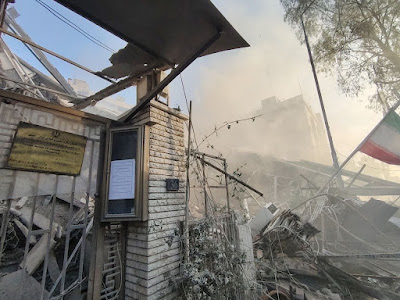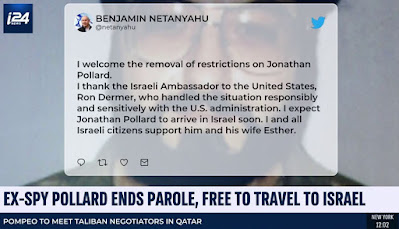Since taking office on January 20, Biden has signaled to
both the Iranians and our allies alike that he will be attempting to engage the
Iranians, despite the consistent Iranian repudiation of Obama’s efforts to do
the same during his eight years in office. In the past few days, Secretary of
State Tony Blinken, a former Obama official, has stated, “The path to diplomacy
is open right now” with Iran.
Let’s follow that thought – just who will be advising Biden
on his Iran
foreign policy decisions? Three key advisors have roots in the Obama
Administration – we know how its Iran policy turned out. Remember
the optic of pallets of cash being flown to Iran just as American hostages were
released. Although Obama insisted there was no linkage between the cash
deliveries and hostage releases, Iranian officials have stated unequivocally
that there was.
Blinken previously served in the Obama Administration as Deputy
National Security Advisor from 2013 to 2015 and Deputy Secretary of State from
2015 to 2017. Before that, from 2009 to 2013, he was the National Security
Advisor to Vice President Biden. His focus was, among other things, Iran’s nuclear
program.
Then we have National Security Advisor Jake Sullivan. Sullivan
worked in the Obama Administration as Director of Policy Planning at the Department
of State, and as Deputy Chief of Staff to Secretary of State Hillary Clinton,
then as National Security Advisor to Vice President Biden from 2013 to 2014. He
was also a senior advisor for the Iran nuclear negotiations.
Rounding out the Iran team is Special Representative
for Iran Robert Malley. Malley’s claim to fame (or infamy) is being the lead
negotiator (or capitulator) of the 2015 Iran nuclear deal, the so-called Joint
Comprehensive Plan of Action (JCPOA). In the Obama Administration, Malley was
designated the National Security Council “point man” for the Middle East, as
well as the special advisor on the Islamic State in Iraq and Syria, ISIS – the
so-called “JV team,” according to Obama. Given the state of American foreign
policy in the region when Obama left office, this is not a sterling résumé.
Biden has tasked Malley to bring both the United States and Iran into compliance with the
JCPOA. I’m not sure that is technically possible, since the United States
is no longer a party to the JCPOA. I take that as an indication where the Biden
Administration is heading – a new round of concessions and capitulations to the
mullahs in Tehran.
It could be worse. If John Kerry had not been named as the
jet-setting Special Envoy on Climate Change, he would likely be advising Biden
on Iran.
Thank God for small mercies.
Former Director of the Central Intelligence Agency and
Secretary of Defense Robert Gates said of Biden, “He has been wrong on nearly
every major foreign policy and national security issue over the past four
decades.” With these three – Blinken, Sullivan, and Malley – advising Biden on Iran, I don’t
expect that record to improve.
In addition to this Obama-rerun cast of advisors, let’s look
at some of the actions of the new administration in “containing” Iran.
Some of the first actions Biden has taken in the region was
to freeze the sale of F-35 stealth fighter jets to the United Arab Emirates.
Access to this advanced aircraft was a sweetener on the UAE-Israel track of the
Abrahamic Accords. Of course, the Biden Administration may not care if that
historic agreement falls through – it does not appear that Biden is that
friendly to Jerusalem.
After almost a month in office, Biden has yet to call
Prime Minister Benjamin Netanyahu – you’d think that a call to America’s closest ally in the region would have
already happened, but the Democrats have generally never been fond of Israel,
especially when it is led by the Likud party.
Biden has also frozen impending sales of advanced munitions
to Saudi Arabia, a measure
of disapproval of Saudi (and UAE) military operations against the Huthi-led
revolt in Yemen.
In an even more incredulous, and in my opinion, utterly
moronic, move, Biden has removed the Huthi movement – a Shi’a militant group
supported, trained, and armed by Iran – from the State Department’s
list of Foreign Terrorist Organizations.
It is ironic – right out of the gate, Biden has protected a
terrorist group supported by the world’s leading state supporter of terrorism,
and taken punitive measures against the two countries leading the fight in
support of the Yemeni government which the United States recognizes.
Here’s what to watch in the near future. On February 15, a
group believed to be associated with Iranian-supported Iraqi Shi’a militias
claimed responsibility for an attack on a U.S.
coalition facility in Irbil, the capital of the
Kurdish Autonomous Region in northern Iraq. The attack killed a foreign
worker and wounded several U.S.
contractors, as well as wounding an American servicemember.
What will Biden do in response? If he does nothing, he will
be perceived as weak. If that is the case, he will have failed the test – get
ready for increased Iranian-sponsored militia attacks on US and allied
coalition facilities and personnel.
With the Obama Administration holdovers, the team that brought
us the dangerous and disastrous JCPOA, we have some insight as to where Biden’s
policy toward Iran
is likely headed.
It is not a good place.





















.jpg)
